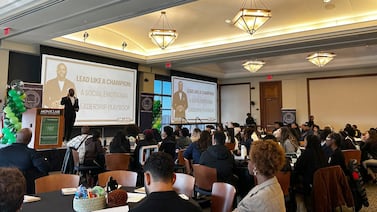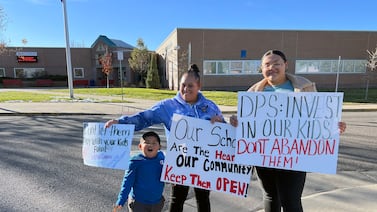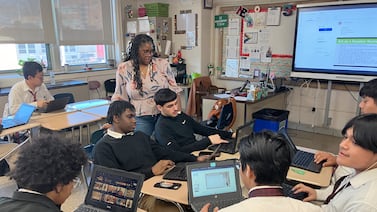Sign up for Chalkbeat Newark’s free newsletter to keep up with the city’s public school system.
After Kevin Able found himself bouncing between schools in Pennsylvania and New Jersey, he didn’t expect to graduate high school.
Mental health challenges and home-life struggles made it harder to keep up with his classes and, since he knew he wouldn’t stay at a school for too long, Able gradually disengaged from learning.
Like Able, thousands of young people across the country disengage from school due to violence, trauma, unstable home life, and other reasons. Without the proper support, those students may drop out of school entirely.
When Able did go to class, he was once suspended from a school in Pennsylvania and faced disciplinary measures at other schools for skipping class. He also didn’t feel that his principals or teachers cared if he went to school at all, Able said. At another school, the now 18-year-old said he saw his counselor once during his entire year there.
“I skipped class a lot, and no one would, like, tell me, oh, go to class, like, go be productive. It was like, they’ll see you in the hallway and they’ll just walk right past me,” Able added.
Eventually, he attended LEAD Charter School in Newark where he went from seeing his counselor once a year to every day. Able says the attention to his feelings, motivation to attend classes, and daily check-ins changed his perspective on school.
Last fall, he shared his educational journey with hundreds of students through the Newark Opportunity Youth Network’s “Youth Speak for Themselves” project. Able and nine other youth leaders hosted small group discussions around chronic absenteeism, which were captured by an AI listening tool. The youth leaders were trained to use the AI tool and analyzed hours of recordings to find key themes and quotes they then posted on an interactive listening platform online.
“It was, like, really shocking that a lot of young people I talked to went through, like, the same problems that I went through at my other schools,” Able said.
Through the “Youth Speak for Themselves” project, the youth leaders spoke with more than 170 students across city schools and alumni to determine the challenges and barriers Newark teens face in education. The project, a partnership with Cortico, a nonprofit organization using AI technology to foster public dialogue, was launched to find the root causes of chronic absenteeism and bring young voices to the discussion, said Emilie Stewart, Newark Opportunity Youth Network’s manager of policy advocacy and community engagement.
The listening tool — created by Cortico, a partner with the Massachusetts Institute of Technology’s Center for Constructive Communication — allowed Able to learn new skills that helped create the interactive listening platform and was the first time he used an AI program.
To address privacy concerns, young people ages 14-24 participated in the conversations with only their first names posted in the portal along with their comments. Participants were not asked to identify what Newark schools they attend or have attended.
“We wanted to hear young people’s voices and their experiences,” Stewart said. “Not just me talking about what I think they’re going through, but them sharing what they might be experiencing.”
Chronic absenteeism, defined by New Jersey as missing 10% or more of the school year, rose to 16.6% in the 2022-23 school year according to state data. That means students are missing more school than before the COVID-19 pandemic. In Newark Public Schools, 4,458 students, or 12.7%, were chronically absent, during the 2022-23 school year when 42,248 pre-K-12 grade students were enrolled, according to state school performance data. Across all city high schools over 30% of high school students are regularly absent, according to the Newark Opportunity Youth Network.Some city schools have used attendance campaigns to motivate students to get to class every day, while others have launched incentive programs offering gift cards and hockey tickets to high school students to help reduce absenteeism rates.
Students skip school when they don’t feel supported
But students who participated in the Newark Opportunity Youth Network’s small group conversations said feeling a sense of belonging in their school communities and having access to personalized mental health support is important to draw and keep teens in class.
“For me, I’ll say an enabling environment that is so inclusive, no racism, no judgments, no stigma, and strict rules on these regulations. Maybe bodies that will be around to actually see through this. And people’s needs, students’ needs, should be heard,” said Lola, a participant in the project whose comment was posted on the online portal.
Zah, another participant, said his father passed away during the pandemic – a time when schools were forced to lock down and switch to remote learning, further exacerbating mental health and emotional problems. He reached out to his teachers to let them know he didn’t feel like speaking during virtual class but didn’t feel supported, Zah said.
“When I emailed all the teachers, I said I wasn’t in the right headspace to talk whatever, but they said I needed to get over that. I got an email back from one of the teachers, they was like, oh, I’m sorry for the loss but you still need to participate this, that, and the third,” said Zah, a participant in the project.
Cayla, another student participant, said she didn’t like school because “of how it wasn’t always focused on learning, it was more focused on being told what to do.” Abe, who also participated in the conversations, said he needed “another Black man, like somebody older than me, that’s been through everything I’ve been through” to talk through his personal and school problems.
Able, the youth leader moderator, said he had a “wow” moment when he realized other teens had dealt with similar experiences as his. Knowing that other students shared the same problems means schools could learn to address attendance issues in multiple ways, Able added.
Some project participants said teachers need professional development training to intervene in situations where students are being bullied. Able agreed and said educators should learn to address situations in a way that doesn’t lead to punitive measures such as suspensions or expulsion. Al, another project participant, said he faced harsh disciplinary measures at his old school for not being engaged and always “felt like a menace.”
“Anything I did, I could speak a certain way, it was like, go to the office, go do this,” said Al, whose comment was posted online.
Stewart, Newark Opportunity Youth Network staff member who led the project, said she hopes the interactive online portal will serve as a tool for city organizations and schools to learn and find ways to tackle low attendance and reengage students. The organization also plans to bring the tool to lawmakers to help create legislation to tackle chronic absenteeism and other issues in New Jersey schools.
“I think this is really interesting and underscores the fact that every young person is different, and even though there are these similar, key themes, youth have different needs and they need different resources and supports,” Stewart said.
Able, who graduated from LEAD this year, says he’s headed to the National Guard next month but continues to advocate for students in Newark. He hopes adults use the online portal to help teens like him succeed.
“The adults need to pay attention and literally just listen and, like, be there for the young person,” Able said, “because you never know what’s going on at home.”
Jessie Gomez is a reporter for Chalkbeat Newark, covering public education in the city. Contact Jessie at jgomez@chalkbeat.org.







